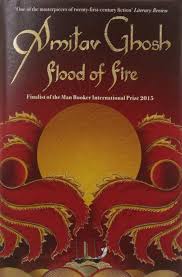 |
Flood of Fire is the third novel of Amitav Ghosh’s Ibis Trilogy, which also includes Sea of Poppies and River of Fire. This narrative of this ambitious series set in India and China from 1838-42 revolves around the opium trade from the perspectives of a diverse sey of players: colonial and local traders, soldiers and officers, sailors and sea captains, farmers and local landowners – and their wives and children. We follow an unlikely set of acquaintances who were thrown together by circumstance in Sea of Poppies and whose stories now come to a conclusion against the backdrop of the cruel and violent Opium War. Book Group Three had already read Sea of Poppies some years back while several of our members had since followed the story through River of Smoke.
This book opens in India where preparations are being made by army, navy and civilians to launch a military expedition intending to force the Chinese to lift the Opium Ban, which has damaged the profits of the British East India Company in this lucrative commodity. The story is told through the eyes of a motley group of characters, each of whom has their own reasons for travelling to China. Although the novels are supposed to stand alone, we rather thought that the complexities of the various back-stories of the main characters make it challenging for those who are new to the trilogy - and their experience was less rich as a result. |
|
Ghosh’s language is rich and reminiscent of 19th century novelists like Dickens. His characters use a rich polyglot patois of Hindustani, pidgin, and British/American slang of the day, which is ripe for humour, misunderstanding, malapropisms and unexpected plot developments that give a vibrant authenticity to the period setting. Some readers enjoyed deciphering the meanings in context (which is possible given Ghosh’s masterful hand with language), whilst others (particularly those new to his work) were frustrated by its lack of explanation or glossary. All agreed that certain episodes (particularly when Mrs. Burnham and her lover make love using her fruity colonial slang) were hilarious. So specific was the language of each character, that one could always hear each individual voice in the dialogue.
The characters are also very unusual, eccentric and fully fleshed in most cases; even those who change radically over the course of the three novels seem to have made believable transitions in the face of what they had experienced. Ghosh’s women often act against stereotype, rising above the restrictions of their gender and taking control of their lives, even if they ultimately pay a high price. They certainly provide us with some of the best-loved characters. One common theme for all the characters was that most were escaping their caste, class or gender in some form or other, with varying degrees of success, something that seemed more possible in the fluid colonial Asia of the nineteenth century.
Central themes of the book involve the clash of civilisations old and new, the role of science and religion, how geopolitics is usually driven by economics, the cost of so-called ‘progress’ and, of course, the immorality of the Opium Trade itself. British attitudes and hypocrisy shocked us and yet so did the Chinese inability to face the modern world to the extent that they seemed to contribute in their own downfall.
Book Group One was divided in its opinions about Flood of Fire, to such an extent that it was difficult to give the book a rating out of 5 that would be agreed by all! Those who had read earlier novels generally liked it much more, with some regarding it as Ghosh’s masterpiece, while others (notably those new to the series) were more critical, preferring his earlier works, such as The Glass Palace. But everyone agreed that the research and re-creation of a fascinating and shameful part of colonial history was an astonishing achievement. We also discussed the fact that many of the themes of this book are still relevant in today’s world. History might repeat itself but sadly humans rarely seem to learn from it!
Rose Gan |
|




